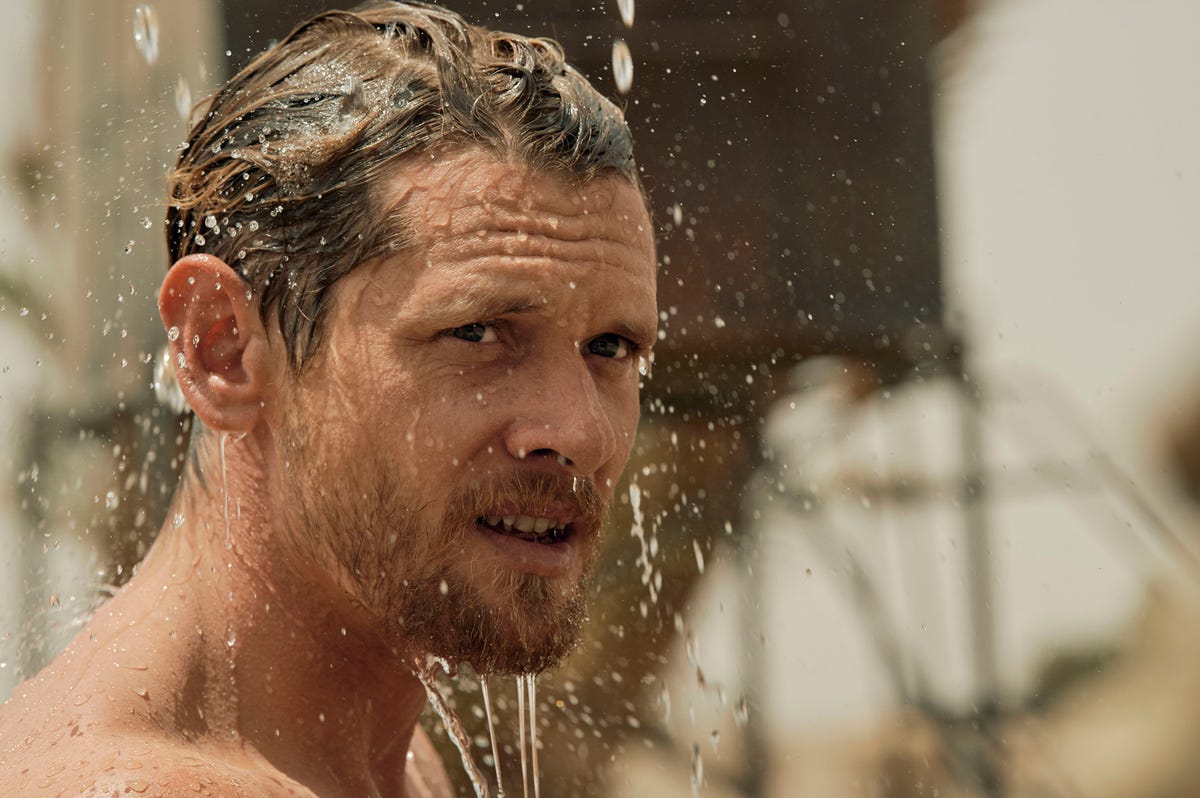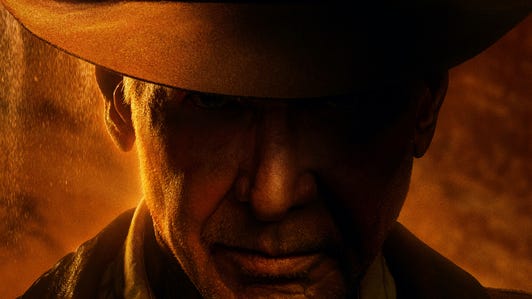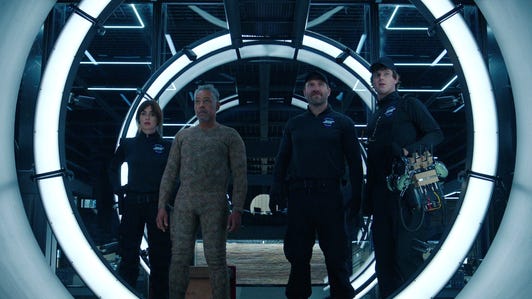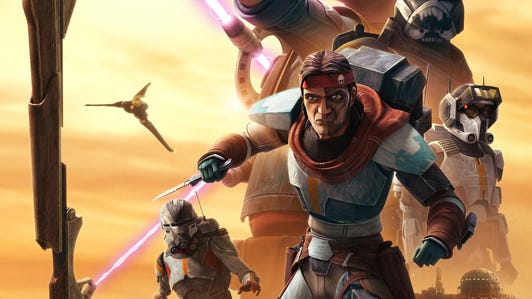
The men of the World War II action TV show Rogue Heroes pioneered a new form of cutthroat warfare, taking the fight to the enemy with no mercy. In the hands of Peaky Blinders creator Steven Knight, the flawed founders of the infamous SAS may or may not have been heroes, but they were definitely rogues.
As well as writing Peaky Blinders and See, Knight has recounted real-life historical events in dramas like Amazing Grace, Spencer (which starred Kristen Stewart as Princess Diana) and a forthcoming drama about Enzo Ferrari. But he continually returns to World War II in stories like Rogue Heroes, Brad Pitt movie Allied and an adaptation of the Pulitzer-winning novel All the Light We Cannot See. Knight believes WW II gives storytellers a unique opportunity: "It's good versus bad," he told CNET over Zoom. "Pretty universally people will say the allies are good -- well, there might be a few people who disagree with that, but mostly you have good versus bad, and when people are doing something fundamentally good, they can do lots of bad things and be forgiven."
Rogue Heroes aired on the BBC in the UK and reaches its finale Sunday, Dec. 18, in the US on Epix (soon to be rebranded MGM Plus). The action-packed show has been renewed for season 2, meaning we'll see the men of the SAS blasting their way into more daring raids throughout World War II.
In real life, the infamous Special Air Service was founded by maverick officers David Stirling, John "Jock" Lewes and Robert "Paddy" Mayne. Based on Ben Macintyre's nonfiction book of the same name, each episode opens by noting "the events depicted which seem most unbelievable… are mostly true." In fact, Knight says he had to tone down some of the wilder real events: In one scene he depicts Stirling clearing a bar by tossing a smoke grenade onto a pool table, but the real Stirling reportedly used an actual live grenade. While the competition between the men is a key part of the show, Knight felt viewers would never believe a real-life incident where Mayne learned Stirling had destroyed more enemy planes than him, and so promptly raced back into enemy territory to bag some more for himself -- nearly getting killed in the process.
Connor Swindells of Sex Education and the forthcoming Barbie movie plays Stirling as a troubled officer struggling to live up to the expectations of his father (a general). As Jock Lewes, Alfie Allen from Game of Thrones and John Wick is the voice of reason in this unholy trio. And finally, Jack O'Connell of Skins, Starred Up and Unbreakable plays Irishman Paddy Mayne as a soulful but volatile warrior poet.
For Knight, the most important thing was to explore the people and how they reacted to this extreme and absurd situation, even if that meant finessing historical detail with additions like a fictional French spy played by Sofia Boutella. "History tends to smooth things out," says Knight. "History [books] select things that make it seem everything happens for a reason, when in fact there's a lot of chaos, a lot of randomness, a lot of madness, a lot of human frailty. I tried to keep it true first of all to the character, but also true to the randomness of reality. If you can try and write as if you don't know what's going to happen with these characters, it does help to feel real."
The devil-may-care soldiers of the newly founded SAS are depicted as united by disdain for the top brass and determined to do things their own way, which means disappearing into the desert and launching explosive commando raids against enemy airfields. Their anarchic spirit is symbolized in the show by a soundtrack of AC/DC, the Clash and Motorhead riffing mightily as soldiers spit hot lead from vehicles blazing through the desert. The series combines the thrills of stirring war adventures like The Great Escape and The Guns of Navarone with the updated swagger of Peaky Blinders and Inglourious Basterds.

Jack O'Connell braves the elements in Rogue Heroes.
BBC/EpixAlthough O'Connell has played soldiers before in films like '71 and Unbroken, Rogue Heroes was a chance to live out his boyhood dreams from his days as a military cadet. "I wanted my stripes and to take drill sessions, but I never really progressed through the ranks," he remembers. "I did want to be in the Army as a kid, but it was probably better advice to just pretend."
But amid the high-octane action, O'Connell notes that the all-encompassing nature of World War II made it a very different time compared with contemporary attitudes to conflict. "That war was something that in some way or another affected everybody," he points out. "What that might do to the mentality on the whole, from a societal point of view, is something that is interesting to study with stories like these."
On an individual level, O'Connell is interested in people like Stirling, Lewes and Mayne who rose to the occasion in wartime. The real-life Mayne was a well-bred solicitor and international rugby player rather than the anarchic wild man O'Connell plays in the series, but was also a man who thrived amid the chaos and bloodshed. "It's interesting to figure out why," says O'Connell. "What causes that? It does become a fascinating psychological study as well."

Rogue Heroes mixes a cocktail of action and intrigue with Sofia Boutella.
BBC/EpixUnlike most of the other characters, the show's version of David Stirling is depicted navigating both the chaos of desert warfare and the more subtle savagery of politics back at base. Calling himself "as working class as they come," Swindells found it a challenge playing an aristocratic officer -- even a drunken self-loathing one -- but also saw a character at odds with himself and his place in the world. "He [Stirling] knew it was necessary that someone had to have a position where strings can be pulled, and he knew that he had that ability," says Swindells of his character. "He wasn't the most physically gifted of them all, and if anything he had a fair bit of bad luck in the beginning. So the only thing he had in his back pocket was his class."
While Swindells got to play opposite Dominic West and Sofia Boutella in bars and bedrooms, the rest of the cast spent much of their time in the desert. Many of the cast of mostly young men from the UK, France, Ireland and around the world were freed from COVID lockdown for the shoot in 2021 in Morocco and the UK. "It was definitely more like a group of lads on tour," says O'Connell, who drily compares the experience to a bachelor party. "It was like a stag do. ... It was good craic."
For Allen, it was a different experience from making Game of Thrones, if only because of the isolation of the harsh location. At least the heat and dust of the Sahara helped Allen get into what he describes as a sort of "method acting," as the cast all too realistically portrayed the unpleasantness of being deep in the desert.
O'Connell can't seem to get enough of playing prisoners of war or sailors lost in the arctic or countless other men tortured in horrible settings. He sees genuine physical adversity helping his performance. "It gives you something less to have to perform because you're under the cosh anyway," the actor explains. "You've got a bit more license to make [acting] decisions based on what you're experiencing in real time, which is good fun. In some perverse way."









 Add Category
Add Category




